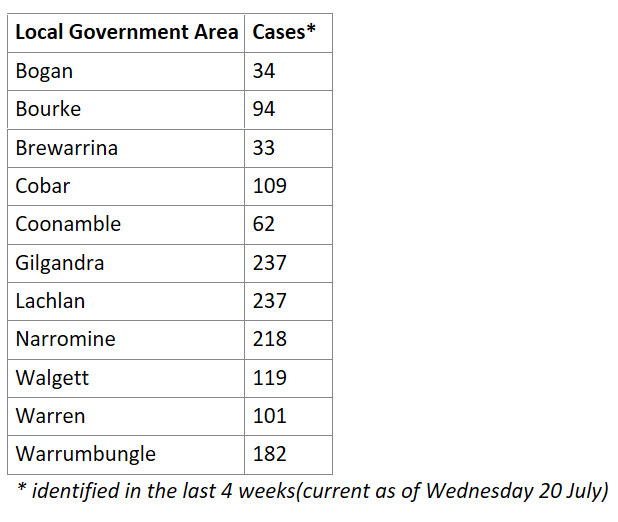COVID control back in the spotlight
Coonamble Times
19 July 2022, 9:07 PM
 They may not be mandatory but don't hang up your mask too soon as winter sees infections surge.
They may not be mandatory but don't hang up your mask too soon as winter sees infections surge.By OLIVER BROWN
While governments steadfastly avoid the reintroduction of tighter controls, health authorities are once again urging NSW residents to be wary of COVID-19.
Cases are surging across the state with winter now in full-swing.
Within the past week, more than 100,000 cases have been recorded with over 10,000 cases being recorded every 24 hours in NSW alone.
For Western NSW Local Health District the official figures show 4078 cases in the four weeks to Monday 18 July.
A breakdown of the numbers reported in the Western Plains (as of Wednesday 20 July) over the last four weeks can be seen below.

Despite the numbers out in regional NSW not being as high as they were in previous peaks of the pandemic, a spokesperson from the Western NSW Local Health District (WNSWLHD) said now is not the time to be complacent, no matter where you live.
Preparing for worse
“Hospitals across Western NSW Local Health District (WNSWLHD) continue to experience significant demand due to COVID-19 and influenza-like-illnesses (ILI),” the spokesperson said.
“The number of emergency department (ED) presentations with ILIs across the District has increased from previous years and only a small percentage require hospital admission, demand remains high as COVID-19 continues to circulate in our communities.
“As levels of community transmission of COVID-19 increase across the state, WNSWLHD is preparing for an expected spike in the number of identified cases across the District in the coming weeks.”
The spokesperson said the LHD was prepared for surging case numbers if needed, however continued to urge communities to continue playing their role in reducing the spread of viral illnesses to minimise the impact they have on health services and workforce.
Local community still cautious
CEO of the Coonamble Aboriginal Health Service (CAHS) Phil Naden said regardless of active case numbers, he believed CAHS and the community overall was remaining cautious against COVID-19.
“I don’t think we’ve become complacent. We’re definitely still aware that COVID exists in our communities and still maintain the same precautions as when it first appeared,” Mr Naden said.
“We do understand the complexities of what we’re coming to know as the ‘third wave’ and we will continue to monitor and assess the situation and mitigate risk where needed.
“Recently we partnered with the Department of Aboriginal Affairs who issued our health staff with additional PPE equipment in the event things spike.”
Re-infection risk
Last week, NSW Health announced the official COVID-19 reinfection period would be reduced from 12 weeks down to four weeks, meaning any people exhibiting symptoms 28 days after recovering from infection must test again and would be considered new cases if they test positive.
NSW Health Chief Executive Dr Kerry Chant said this was put in place due to some new Omicron subvariants circulating in the NSW community.
“The Omicron BA.4 and BA.5 subvariants are circulating widely in NSW. They are more able to evade immunity gained from previous infection and vaccination reinfection is more likely and possible just weeks after a prior infection,” Dr Chant said.
“We’re urging people who have recently had COVID-19, even if they left isolation in the past four weeks, not to be complacent. If you develop symptoms again, make sure to test and isolate.”
Booster benefits
The winter COVID-19 vaccination booster program has also been expanded to include any people aged 30 and over and is strongly recommended for anyone aged 50 and over.
Mr Naden said CAHS was continuing to work to educate their clients about the importance of getting their third booster shots and fourth if they are eligible.
“I think because there’s no mandatory requirement for boosters, it has and will continue to be a challenge for us to encourage people to get them without educating them, which is what we will continue to do,” he said.
“We have to recognise that COVID is in our communities. It might display different symptoms in different people but it is a virus that has taken the lives of a lot of people and we can’t afford to be complacent.”
New school rules
With students returning after school holidays this week, a set of COVID-smart rules have also been introduced at NSW public schools.
NSW Education Secretary Georgina Harrisson said the measures, which will roll out over the first four weeks of term, would be similar to the rules set out previously with some new additions.
“We are being extra vigilant to get the term off to the best start – supporting our staff and students with extra supplies of rapid antigen tests and masks, and encouraging them to stay at home if unwell,” Ms Harrisson said.
The Department of Education will be removing the mandatory vaccination requirement for all school staff, except for those working in or with Schools for Specific Purpose (SSPs), where students may be at greater risk of serious illness if they contract COVID-19.
However, the department strongly encourages staff to continue to keep their vaccination status up to date.
Free RATs continue for concession holders
The NSW Government also announced last week that it would provide 10 free Rapid Antigen Tests for Commonwealth Concession Card holders in NSW to help more vulnerable communities stay on top of potential spread.
The expanded program will be available over three months up until 31 October 2022.
The tests are being made available through 210 neighbourhood and community centres located across the state.
The Coonamble Neighbourhood Centre is on the list of participating centres and according to a Department of Communities and Justice spokesperson, will receive an additional supply of 300 RATs over the next week.




